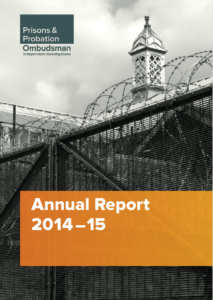Prisons and Probation Ombudsman
The Prisons and Probation Ombudsman, Nigel Newcombe, published his team’s annual report for 2014/15 last week (10 September 2015).
The full 105 page report makes for harrowing reading as it contains details about investigations into fatal incidents, particularly suicides which I covered in a previous post.
The ombudsman puts suicide prevention centre stage in this report, and although there was a 16% reduction in the number of self-inflicted deaths in custody in the last year, he highlights the fact that:
The number of self-inflicted deaths in custody remains unacceptably high, in 2014 – 15, there were still 38% more than in 2012 – 13.
Here are ten key facts that I learnt from the report, I hope they are of interest to you:
1: There was a 15% rise in deaths from natural causes
Most of these deaths were among older prisoners and are a reflection of a rapidly ageing prison population. The fastest-growing segment of the prison population is prisoners over 60, and the second fastest is prisoners over 50.
2: The overall number of complaints to the ombudsman rose.
Although complaints were only up 2% in the year to a total of 4,964, the number of eligible complaints accepted for investigation increased by 13%. What is more, 39% of these complaints were upheld (up from 34% the previous year).
Most of these complaints (92%) were about prisons. There were just 318 complaints about probation (15% less than the year before) and 62 from immigration detention (down 6% on the previous year).
3: There were four homicides in prison in the last year (the same as the previous year).
4: The ombudsman highlighted six factors associated with fatal incidents.
These were:
- Inadequate risk assessment in prison receptions,
- Weak implementation of ACCT (Assessment, Care in Custody and Teamwork) for those at risk,
- Delays in emergency responses,
- A number of vulnerable men dying in segregation units,
- The deaths of several men subject to restraining orders, and
- Death relating to hard to detect new psychoactive substances.
5: Prisons are increasingly having to provide end-of-life care to prisoners with terminal illnesses.
Although there were a number of examples of substandard care, in other cases care was compassionate; the ombudsman reports on one case where a son was serving in the same prison as his terminally ill father. The Prison moved his son into an adjoining cell both in the healthcare unit and, at the end of his life, in the palliative care suite.
6: There was a big increase in complaints about the new incentives and earned privileges arrangements (IEP).
It appears that IEP was being used for all sorts of reasons. The ombudsman cites a case about a prisoner who had been downgraded from Enhanced all the way down to Basic because he was maintaining his innocence. The prisoner had been on Enhanced for six years, and was convicted of serious sexual offences which he denied. He completed all the work set in his sentence plan apart from the Sex Offenders Treatment Programme which he was unable to undertake as he denied that he committed his offence. The prison told the ombudsman that they had hoped that the downgrade to Basic would act as an incentive to get the prisoner to accept his guilt and undertake the SOTP. The ombudsman ruled that this was not acceptable and recommended that the prisoner should be placed on the Standard level of IEP.
7: Prisons continue to wrongly open legally privileged mail.
Letters from solicitors and other privileged sources should not be opened or read by staff. However, the ombudsman receives many complaints about this every year.
8: Lack of decency
The prison service only requires that toilet screens are provided in double cells. A prisoner complained that there was no toilet screen in his single cell and that, as a result, staff of both sexes and passing prisoners could see him using the toilet. The ombudsman upheld this complaint and recommended that NOMS should require toilet screens installed in all single cells across the prison estate. However, it is not clear whether or when the current austerity programme will allow this.
9: The number of complaints against staff increased by 23%.
A total of 134 complaints were investigated about staff behaviour towards prisoners and immigration detainees. In one case CCTV footage enabled the ombudsman to conclude that unnecessary force had been used against a prisoner. Prison staff are starting to wear body cameras in some situations such as segregation units, which should help reduce the numbers of such incidents in the future.
10: The majority of probation complaints were about the behaviour of offender managers or the content of reports.
However, in one interesting case the ombudsman criticised the National Probation Service for not having sufficient approved premises (hostel) capacity to enable one prisoner to be released on temporary leave.
[divider]
Conclusion
The new Justice Secretary Michael Gove has made much of the need to have an ethical criminal justice system. One step he could take towards this goal would be to make the Prisons and Probation Ombudsman’s recommendations legally enforceable.









2 Responses
The report makes interesting reading. However if the PPO actually did its job properly and investigated more complaints (it chucks a staggering number of eligible complaints back at prisoners) the stats would be even more worrying. As for complaining about probation, most people are too scared to because the ever present threat of recall hangs over their heads and people have been recalled for submitting legitimate complaints about their OM’s.
There is a lot of fear for those in prison or on probation when it comes to making a complaint, retaliation is a very real concern. There does seem to be a lack of support for those wishing to make a complaint. We faced the same issue within treatment services for years, with some we still do, but it is getting better with support and understanding on how to make a complaint. Maybe, Russell, you could look at the complaint system within treatment services, see if its used or its fit for purpose. Just a thought.